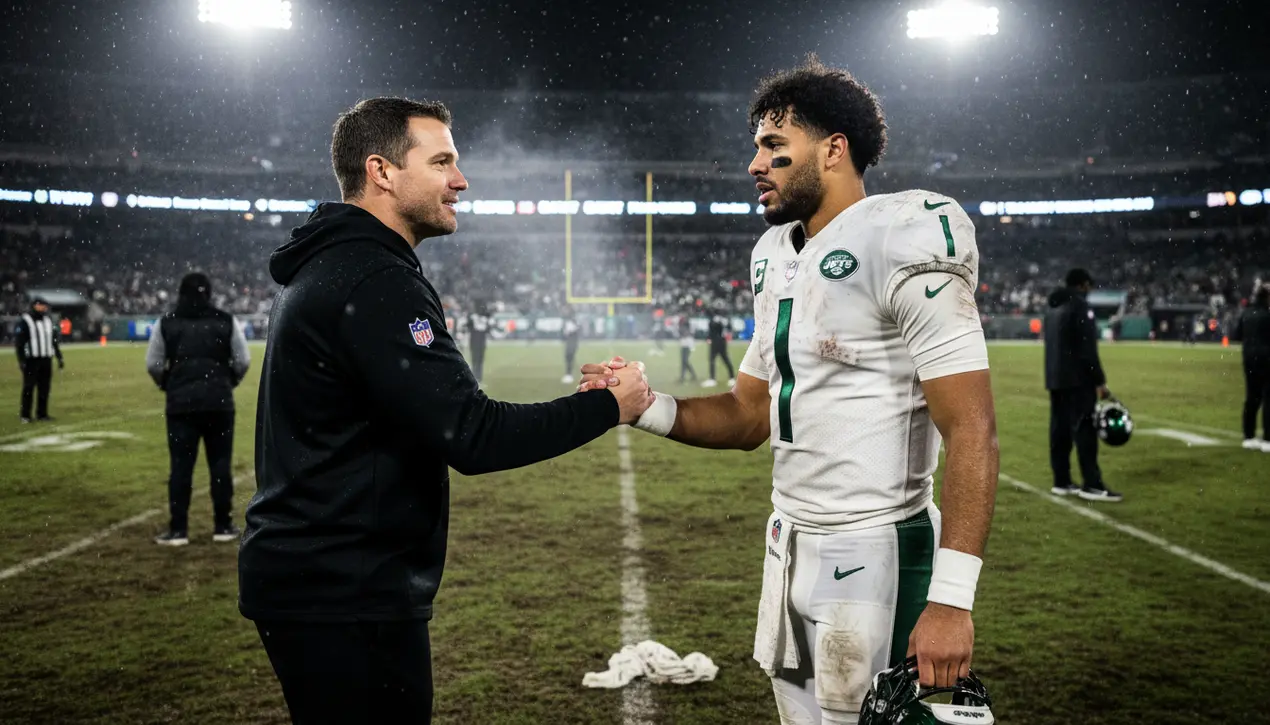
SportfootballInjuries and Suspensions
Aaron Glenn saw some ‘really good things’ from Justin Fields in Jets’ loss to Patriots
JA
Jack Turner
2 hours ago7 min read
In the brutal chess match of NFL football, where every yard is contested like a precious jewel, the New York Jets' Thursday night performance against the New England Patriots was a classic tale of two halves, a narrative arc that would feel familiar to any student of the game's grueling demands. The opening drive was a thing of beauty, a meticulously crafted 17-play masterpiece that saw quarterback Justin Fields operating with the surgical precision of a young Aaron Rodgers, mixing calculated passes with dynamic scrambles to march his team down the field for an early seven-point lead.It was a statement drive, the kind that analytics departments dream of, showcasing a perfect balance of play-calling and execution. Fields, in that initial series, looked every bit the dual-threat phenom he was drafted to be, evoking comparisons to legends like Michael Vick with his electrifying combination of arm talent and game-breaking speed.Yet, as so often happens in the AFC East, the Patriots adjusted, and the Jets' offensive engine sputtered and stalled with a suddenness that was jarring. The 21 unanswered points surrendered by New York weren't just numbers on a scoreboard; they were a systematic dismantling, a testament to Bill Belichick's defensive genius and his uncanny ability to take away an opponent's primary weapon.From that point forward, Fields was effectively contained, finishing the night with a modest 116 passing yards and 67 rushing yards, his two touchdowns overshadowed by a critical fourth-quarter fumble deep in his own territory that effectively sealed the 27-14 victory for the division rivals. The post-game narrative was a study in contrasting perspectives.Fields himself was brutally self-critical, stating with the grim accountability of a team leader, 'Not good enough. We lost the game so we weren't good enough—every time we lose my performance isn't good enough out there.' This kind of ownership is commendable, reminiscent of Tom Brady's famous self-flagellation after even the most resounding victories. However, head coach Aaron Glenn provided a fascinating counterpoint, looking beyond the box score to find glimmers of hope.'There are some really good things,' Glenn asserted, deflecting some of the blame from his quarterback. 'I thought he put some balls out there and we’ve got to have some guys make some plays—I know he’s going to say there’s some things he could’ve done better, but there are some good things he did.' This divergence of opinion is the heart of the modern quarterback evaluation process. Is a QB's performance defined solely by the win-loss column and turnover-worthy plays, or is there value in the process, in the 'what could have been' if a receiver makes a difficult catch? For Fields, this game is a microcosm of his entire career thus far: flashes of transcendent talent punctuated by moments of critical error.The upcoming decision for the Jets' brass is monumental. Does this performance, with its promising start and subsequent struggles, warrant another start against a formidable Baltimore Ravens defense? Or does the organization look to the future, weighing Fields' long-term potential against the immediate need for consistent, mistake-free football? The answer will reveal much about the team's direction and whether they believe their quarterback's development arc is on a trajectory toward greatness or destined to be another 'what if' story in the annals of NFL history.
#featured
#Justin Fields
#Aaron Glenn
#New York Jets
#New England Patriots
#NFL
#quarterback performance
Stay Informed. Act Smarter.
Get weekly highlights, major headlines, and expert insights — then put your knowledge to work in our live prediction markets.
Related News
Comments
Loading comments...
© 2025 Outpoll Service LTD. All rights reserved.